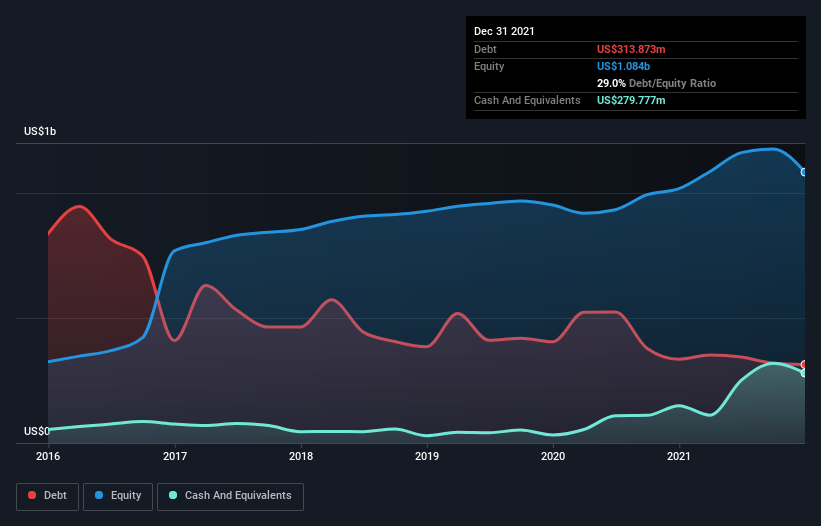- United States
- /
- Leisure
- /
- NYSE:GOLF
These 4 Measures Indicate That Acushnet Holdings (NYSE:GOLF) Is Using Debt Safely

Some say volatility, rather than debt, is the best way to think about risk as an investor, but Warren Buffett famously said that 'Volatility is far from synonymous with risk.' So it might be obvious that you need to consider debt, when you think about how risky any given stock is, because too much debt can sink a company. We note that Acushnet Holdings Corp. (NYSE:GOLF) does have debt on its balance sheet. But the real question is whether this debt is making the company risky.
When Is Debt A Problem?
Debt and other liabilities become risky for a business when it cannot easily fulfill those obligations, either with free cash flow or by raising capital at an attractive price. If things get really bad, the lenders can take control of the business. However, a more frequent (but still costly) occurrence is where a company must issue shares at bargain-basement prices, permanently diluting shareholders, just to shore up its balance sheet. Of course, the upside of debt is that it often represents cheap capital, especially when it replaces dilution in a company with the ability to reinvest at high rates of return. When we think about a company's use of debt, we first look at cash and debt together.
Check out our latest analysis for Acushnet Holdings
How Much Debt Does Acushnet Holdings Carry?
As you can see below, Acushnet Holdings had US$313.9m of debt at December 2021, down from US$335.0m a year prior. However, because it has a cash reserve of US$279.8m, its net debt is less, at about US$34.1m.

A Look At Acushnet Holdings' Liabilities
We can see from the most recent balance sheet that Acushnet Holdings had liabilities of US$483.0m falling due within a year, and liabilities of US$439.2m due beyond that. Offsetting these obligations, it had cash of US$279.8m as well as receivables valued at US$174.4m due within 12 months. So its liabilities outweigh the sum of its cash and (near-term) receivables by US$468.1m.
Of course, Acushnet Holdings has a market capitalization of US$2.96b, so these liabilities are probably manageable. But there are sufficient liabilities that we would certainly recommend shareholders continue to monitor the balance sheet, going forward. But either way, Acushnet Holdings has virtually no net debt, so it's fair to say it does not have a heavy debt load!
We use two main ratios to inform us about debt levels relative to earnings. The first is net debt divided by earnings before interest, tax, depreciation, and amortization (EBITDA), while the second is how many times its earnings before interest and tax (EBIT) covers its interest expense (or its interest cover, for short). Thus we consider debt relative to earnings both with and without depreciation and amortization expenses.
Acushnet Holdings's net debt is only 0.12 times its EBITDA. And its EBIT easily covers its interest expense, being 33.2 times the size. So we're pretty relaxed about its super-conservative use of debt. In addition to that, we're happy to report that Acushnet Holdings has boosted its EBIT by 61%, thus reducing the spectre of future debt repayments. There's no doubt that we learn most about debt from the balance sheet. But ultimately the future profitability of the business will decide if Acushnet Holdings can strengthen its balance sheet over time. So if you're focused on the future you can check out this free report showing analyst profit forecasts.
Finally, while the tax-man may adore accounting profits, lenders only accept cold hard cash. So it's worth checking how much of that EBIT is backed by free cash flow. Over the last three years, Acushnet Holdings actually produced more free cash flow than EBIT. There's nothing better than incoming cash when it comes to staying in your lenders' good graces.
Our View
Happily, Acushnet Holdings's impressive interest cover implies it has the upper hand on its debt. And the good news does not stop there, as its conversion of EBIT to free cash flow also supports that impression! We think Acushnet Holdings is no more beholden to its lenders, than the birds are to birdwatchers. To our minds it has a healthy happy balance sheet. There's no doubt that we learn most about debt from the balance sheet. However, not all investment risk resides within the balance sheet - far from it. To that end, you should be aware of the 2 warning signs we've spotted with Acushnet Holdings .
When all is said and done, sometimes its easier to focus on companies that don't even need debt. Readers can access a list of growth stocks with zero net debt 100% free, right now.
New: Manage All Your Stock Portfolios in One Place
We've created the ultimate portfolio companion for stock investors, and it's free.
• Connect an unlimited number of Portfolios and see your total in one currency
• Be alerted to new Warning Signs or Risks via email or mobile
• Track the Fair Value of your stocks
Have feedback on this article? Concerned about the content? Get in touch with us directly. Alternatively, email editorial-team (at) simplywallst.com.
This article by Simply Wall St is general in nature. We provide commentary based on historical data and analyst forecasts only using an unbiased methodology and our articles are not intended to be financial advice. It does not constitute a recommendation to buy or sell any stock, and does not take account of your objectives, or your financial situation. We aim to bring you long-term focused analysis driven by fundamental data. Note that our analysis may not factor in the latest price-sensitive company announcements or qualitative material. Simply Wall St has no position in any stocks mentioned.
About NYSE:GOLF
Acushnet Holdings
Designs, develops, manufactures, and distributes golf products in the United States, Europe, the Middle East, Africa, Japan, Korea, and internationally.
Solid track record with adequate balance sheet.
Similar Companies
Market Insights
Community Narratives



